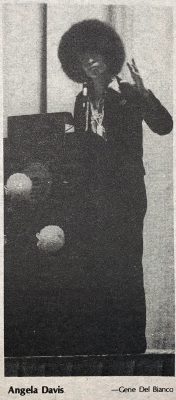 By Judy Wandzilak
By Judy Wandzilak
If you went to Hynes Auditorium Saturday night expecting to see fists flailed in black power salutes and hear militant cries rising from the crowd, you left somewhat disappointed. Speaking to a predominantly young white audience, Angela Davis, folk hero of the revolutionary left, delivered not a scalding tirade, but a passionate plea for a people’s movement to free all prisoners of political and racist repression.
The slim and strikingly attractive black woman received international attention from her 1969 expulsion from the UCLA faculty on grounds of her membership in the Communist Party, and from her early 70’s trial on charges of murder, kidnapping and conspiracy connected with a California courthouse shoot out.
She was at the Boston Globe Book Fair to publicize her recent autobiography, written, she said, not to trace the development of one revolutionary, but to explore the formation of a movement for freedom that evolved around her trial and to inspire others to join this movement.
But her talk dealt mostly with her personal experiences during her imprisonment and trial
She spoke of her months as a fugitive on the FBI’s Ten Most Wanted list, after she had fled California accused of buying the guns for an attempted jail escape which ended in a shoot-out. After he capture in NY, she awaited extradition to California, in the mental ward of the Women’s House of Detention.
The circumstances of her extradition to California, ‘the incredible military apparatus used to transport one black woman,” made her realize, she said, that it was a cause and not an individual her supporters were clamoring for.
She said she was taken from the House of Detention to the airport in a caravan of 20 or 30 police cars, released on an airfield surrounded by hundreds of National Guardsmen with machine guns.
“I realized that I had to walk through those men to the plane” she related, “and if I trip or make some gesture they think is suspicious, well, I’ll find myself lying in a pool of blood. That’s when I realized they weren’t concerned about me as an individual. They were concerned about the rising of a movement of blacks, Chicanos, Puerto Rican, Asians and white people. And that’s why they were afraid.”
Upon arrival in a California prison, Davis said she was given inadequate clothing and placed in a small, freezing flooded cell. She notified her attorney of the
conditions, and the attorney notified the National United Committee to Free Angela Davis which started a campaign of letters and telegrams to the sheriff of Santa Ana prisons. Within days, Davis said, her living conditions had drastically improved.
“I promised myself that if I were ever released as a result of that movement, I would work to form an organization to take their cause to the people.”
From that promise has come the National Alliance against Racist and Political Repression which is, according to Davis, a “multi-racial, national and ideological” organization.
As a representative of the Alliance, she recently testified at hearings for the confirmation of Nelson Rockefeller as Vice-President. “I went to testify in behalf of the Attica brothers,” she said, “in behalf of the 43 human beings who lost their lives because of Rockefeller’s action.”
Throughout her career, people have puzzled over the radicalization of Angela Davis. She grew up in a middle class black neighborhood in Birmingham, Alabama. She graduated magna cum laude from Brandeis University in 1965, and went to Europe to study world renowned political philosopher Herbert Marcuse, who called her the brightest student he ever taught.
And yet she has become a symbol of black militancy and the politics or revolution.
“I did what was natural,” she said. “I looked at my friends and they didn’t have what I did. Black people, and oppressed people in general, develop a sense of community which is forced upon us.
“When someone calls you a name,” she continued, “you know they’re not talking about you; they’re talking about your people.”

























































































































